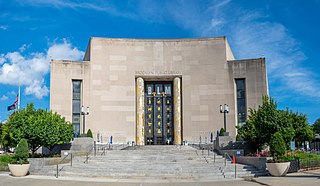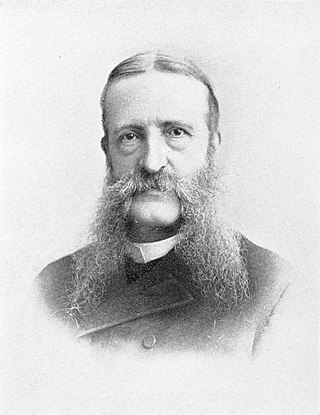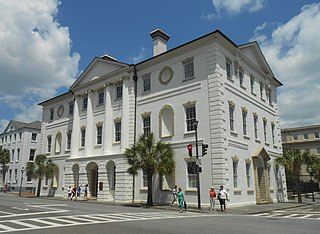
The Brooklyn Public Library (BPL) is the public library system of the New York City borough of Brooklyn. It is the sixteenth largest public library system in the United States by holding and the seventh by number of visitors. Like the two other public library systems in New York City, it is an independent nonprofit organization that is funded by the city and state governments, the federal government, and private donors. In marketing materials, the library styles its name as Bklyn Public Library.

Jonathan Arnold was an American physician and statesman from New England. He was born in Gloucester, Rhode Island, served in the Continental Army as a surgeon, and directed the army hospital in Providence. He represented Rhode Island as a delegate to the Confederation Congress in 1782 and 1783. He moved to a farm in St. Johnsbury, Vermont in 1787, and later served as a judge.

William Frederick Poole was an American bibliographer and librarian.

A subscription library is a library that is financed by private funds either from membership fees or endowments. Unlike a public library, access is often restricted to members, but access rights can also be given to non-members, such as students.

The United Association of Journeymen and Apprentices of the Plumbing and Pipe Fitting Industry of the United States and Canada, commonly known as the United Association (UA), is a labor union which represents workers in the plumbing and pipefitting industries in the United States and Canada.

Russell Warren (1783–1860) was an American architect, best known for his work in the Greek Revival style. He practiced in Bristol and Providence.

Harold Augenbraum is an American writer, editor, and translator. He is the former Executive Director of the National Book Foundation, and former member of the Board of Trustees of the Asian American Writers Workshop, and former vice chair of the New York Council for the Humanities. Before taking up his position at the National Book Foundation in November 2004, for fifteen years Augenbraum was Director of The Mercantile Library of New York, where he established the Center for World Literature, the New York Festival of Mystery, the Clifton Fadiman Medal, and the Proust Society of America. He has been awarded eight grants from the National Endowment for the Humanities, received a Raven Award from the Mystery Writers of America for distinguished service to the mystery field, and coordinated the national celebration of the John Steinbeck Centennial. He is on the advisory board of the literary magazine The Common, based at Amherst College. In 2016, he was awarded an honorary doctorate from Concordia College in Moorhead, Minnesota. He is co-founder, with Alice Kaplan, of the Yale Translation Initiative at Yale University, where he is Associate Director, and from 2017 to 2019 was Acting Editor of The Yale Review.

The Redwood Library and Athenaeum is a subscription library, museum, rare book repository and research center founded in 1747, and located at 50 Bellevue Avenue in Newport, Rhode Island. The building, designed by Peter Harrison and completed in March 1750, was the first purposely built library in the United States, and the oldest neo-Classical building in the country. It has been in continuous use since its opening.

Stone, Carpenter & Willson was a Providence, Rhode Island–based architectural firm in the late 19th and early 20th Centuries. It was named for the partners Alfred Stone (1834–1908), Charles E. Carpenter (1845–1923). and Edmund R. Willson (1856–1906). The firm was one of the state's most prominent.

Charleston Library Society, founded in 1748, is a subscription library in Charleston, South Carolina.

The Providence Athenaeum is an independent, member-supported subscription library in the College Hill neighborhood of Providence, Rhode Island. The building is open to the public, but only members can check out items from the collection.

George E. Harney was a late 19th-century American architect based in New York City.

The Portsmouth Athenæum is an independent membership library, gallery, and museum in Portsmouth, New Hampshire, United States. It preserves and provides access to an extensive collection of manuscripts, rare books, photographs, artworks and artifacts, and digital collections related to local history and genealogy, in addition to a circulating library for its membership. As an intellectual center of the community, it sponsors exhibitions, concerts, lectures, and other educational and cultural programs. The building, dating to 1805, has been listed on the National Register of Historic Places since 1973.

The Tavern Hall Preservation Society is a not-for-profit corporation dedicated to the preservation and upkeep of the Elisha Reynolds House (1738) in Kingston, Rhode Island. The society was founded as the Tavern Hall Club in 1911 to foster understanding and cooperation between the people of the Village of Kingston and the nearby Rhode Island State College community.

The Salem Athenaeum, founded in 1810, is one of the oldest membership libraries in the United States. The Athenaeum is located at 337 Essex Street in Salem, Massachusetts in the McIntire Historic District.

Paul Housberg is an American glass artist recognized for his use of fused and kiln formed glass as an architectural medium. He currently resides in Jamestown, Rhode Island.

Michele Felice Cornè (1752–1845) was an artist born in Elba who settled in the United States. He lived in Salem and Boston, Massachusetts; and in Newport, Rhode Island. He painted marine scenes, portraits, and interior decorations such as fireboards and murals.

The Business & Career Library was a branch of the Brooklyn Public Library (BPL) at 280 Cadman Plaza West in Brooklyn Heights, near Downtown Brooklyn, in New York City. Its history precedes that of the BPL itself. In 1852, prominent citizens established the Brooklyn Athenaeum and Reading Room for the instruction of young men. In 1857, a group of young men established the Brooklyn Mercantile Library Association of the City of Brooklyn, which shared a building with the Athenaeum. The Mercantile Library attempted to be more practical, placing less emphasis on Literature and philosophy. The librarian in charge was Stephen Buttrick Noyes. In 1866, he went to work at the Library of Congress.

















